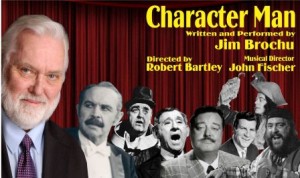
Give My Regards to . . . Broadway's character actors who were the solid anchors of classic musicals although their names may be just on the tip-of-your-tongue. Writer and performer Jim Brochu describes himself as a Character Man, defined as a leading or supporting cast member who also displays unusual characteristics or peculiarities. "And that’s me," says Brochu, "I’m peculiar."
"Special" is more to the point. It was that special something that made Jackie Gleason, Bert Lahr and Zero Motel well-known stars. For others, like Jack Gilford and George S. Irving, that special quality was memorable even though their names may slip your mind. Some character men were better known for television than their work on stage. Charles Nelson Reilly, who won the Tony Award for How to Succeed in Business without Really Trying, is most identified from his game-show appearances. We know Barney Martin best for his role in TV's “Seinfeld.” Jim Brochu knew them all, and he luckily slipped into the world just in time to see many do their best work. Then he realized this was the world where he belonged.
For Brochu, the character man closest to his heart is David Burns (The Music Man, Hello, Dolly!), whom he describes as first his mentor and later his best friend. When Brochu was 12, his father, an occasional theater actor, took him to see his first Broadway show, The Music Man, and introduced him to Burns who played Mayor Shinn. They went to dinner at Toots Shor's with Burns (now called "Davy") and his wife. By the time he saw A Funny Thing Happened to the Way to the Forum starring Burns, Mostel, Gilford, and Phil Silvers, Brochu knew that theater was his destiny.
Burns introduced him to all the big names who let him sit in, listen and absorb. Burns also helped young Jimmy Brochu get his first theater job selling orange drinks at the Alvin Theater where he saw all the shows and then ran backstage to palaver with the actors. He quips, "They were like the Jewish Knights of the Round Table, and I was sitting in the corner like Squire Schmuck."
The natural sincerity of Character Man comes out of Brochu's love for the theater and his fierce appreciation of these first and second bananas. Openly sentimental with a self-deprecating sense of comedy, Brochu moves seamlessly through tales of his boyhood, his career and theater lore, grabbing every chance to meet actors like Cyril Ritchard or Jack Klugman. His father had passed to him a love for the theater, and much of the buoyancy and musicality Brochu shows on stage comes from his charismatic dad. "I never knew he drank until I saw him sober," says Brochu, who further described papa as "a cross between Don Quixote and Auntie Mame when they were both loaded." Years later, when his father was dying, he asked his son to sing something, and what he wanted was "Give My Regards to Broadway." Accompanied on piano by musical director, Carl Haan, Brochu performs 11 show biz standards identified with these actors. With a secure and muscular baritone and at a hefty 6'4", he moves with surprising fluidity. Without imitating, he acknowledges the theatrical power of Zero Mostel's show-stopper in Fiddler on the Roof as Tevya fantasized, "If I Were a Rich Man." He reflects Barney Martin as the dejected Amos in the original Chicago as a poignant "Mr. Cellophane." He brings his own hilarious touch to George S. Irving's signature tune from So Long, 174th Street, "The Butler's Song" and a tongue-twisting nod to Robert Preston's "Trouble." Brochu’s phrasing sells the song.
A believable, articulate storyteller, Brochu compels with a sharp sense of timing. He tells the story of a recent visit to the Alvin Theater, now renamed the Neil Simon ("it will always be the Alvin Theater to me”), and he gets a big laugh recalling, "I walked into the back of the house, and there was the concession stand and a young man behind the counter, and it was me. So I went up to him to buy an orange drink. . . and I couldn't afford it."
Set designer, Patrick Brennan, provided a hint of backstage with three theater seats, a steamer trunk for Brochu to perch on, and the frame of a backstage dressing room. Three screens project show business memorabilia and personal photos including an all-too-brief slideshow nod to the numerous character women of show business. (Except for Kathleen Freeman, this show is men only.) Jim Brochu earned 2010 Drama Desk and Helen Hayes Awards for Zero Hour, his acclaimed tribute to Zero Mostel. In Character Men, he again pulls you along with him into a fast-moving journey through entertainment history with tunes and tales by a master. For theater-lovers, "That's Entertainment."
